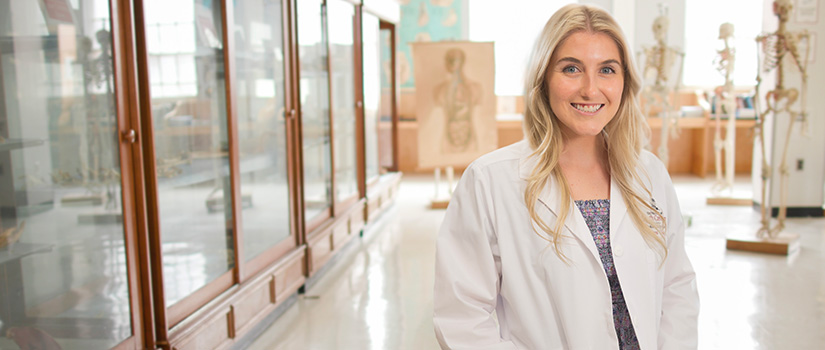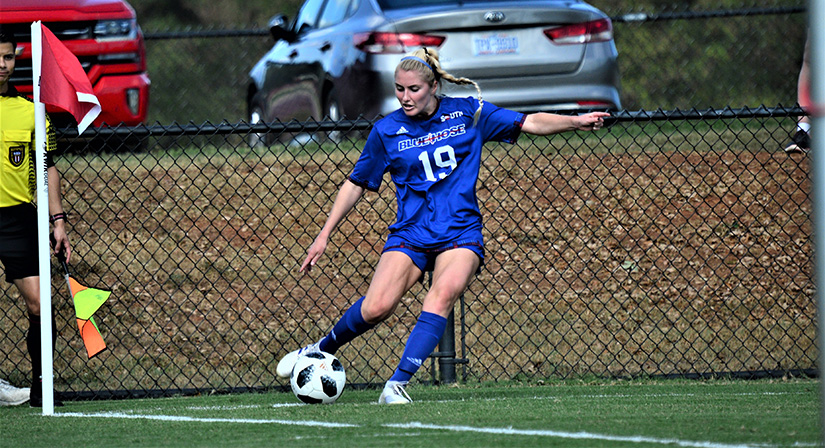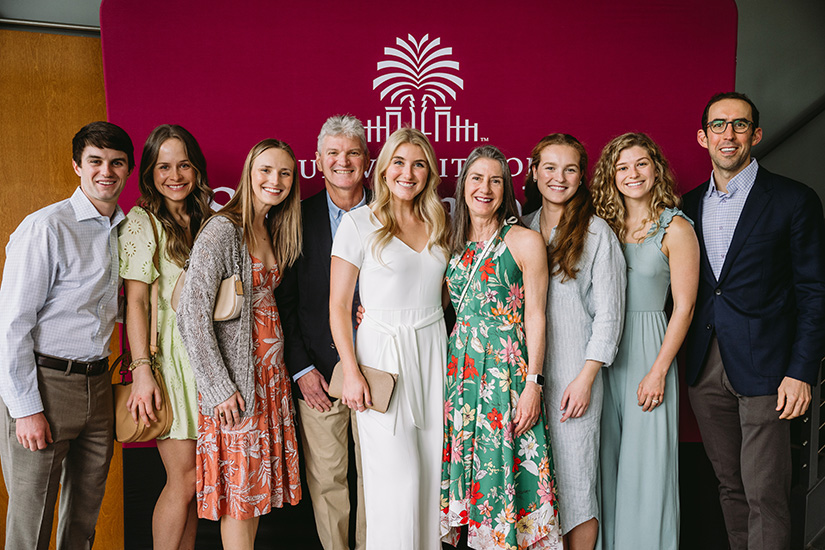Five minutes.
A frame of time that lasts 300 seconds. Those 300 seconds make up just 8.3 percent of every hour and 0.3 percent of every day.
In the eyes and experiences of Emma Gray, a fourth-year medical student at the School of Medicine Columbia, five minutes can be the difference between a positive patient to doctor interaction and one that can lead to mistrust between the two parties.
“I think, half the time, it's just giving someone that extra five minutes of talking that really allows them to be vulnerable with you and open up,” Gray said. “The beauty of being a doctor is you find a way to relate to all of your patients, even when they're really, really different from you.”
For Gray, these five minutes became her “why” for pursuing a career in the field of medicine.
Why Medicine?
It’s the golden question for anyone who chooses to pursue medical school.
“Why?”
For Gray—like so many others—it was a result of becoming exposed to the world of health care at an incredibly formidable time in her life.
“One of my really close family friends actually passed to cancer, and that was I think, my first interaction and exposure to the health care system. It was a long (journey) and went throughout a lot of my high school career,” Gray said.
“When she passed—this may sound very strange, but—I was in AP biology and we were talking about cancer and how epigenetics affects your different genes and expression and I think that got me interested in the science part, while watching her on her walk got me interested in and passionate about the human part. That was the first touch point that I had with health care and knowing that I wanted to do something in that field.”
Awesome Opportunities
Following her four years at Lakeside High School in Atlanta, Gray went on to play collegiate soccer at Presbyterian in nearby Clinton, S.C., majoring in biology with a pre-med track.
While dominating Big South midfields on the pitch, Gray was able to conduct cancer research and further her passion to pursue a life in the field of health care and view it not as a job, but a privilege.
“In college I got awesome opportunities and ended up getting to research breast cancer. I feel like that really fueled the science behind health care for me. It also showed that while I love the science and research behind things, but I also really love the human interaction, and being in a lab, I didn't get that quite as much,” Gray recalled.
“As I'm thinking about these processes, and shadowing different health care professionals, I think I came to the conclusion that being a doctor was just this beautiful thing that we get to do. Not only do we form this relationship with our patients, like my family friend, when she passed—her doctors kind of came alongside her. She opened some of the most intimate parts of her life to these professionals and that is incredibly unique and special. I think every role in the health care field is vital and crucial, because there's so many ways you can impact a patient,” she continued.
To the SOMC
Upon graduating from PC in the midst of a global pandemic, Gray accrued multiple offers from M.D. programs across the country, eventually choosing the University of South Carolina because of a sense of comfort, ease and family the interview process brought to her psyche.
“When it came time for med school interviews, I feel like that really got the ball rolling in reminding me of how comfortable I felt here, versus some of my other interviews,” Gray said. “It was just like the team atmosphere I had playing soccer at PC.
“That made me feel really at home as soon as I came to interview. Even the people I was interviewing with immediately felt like teammates. I feel like the faculty are all very collegial with each other and love each other in just a way that's really special.
“Instead of being competitive with each other here at USC, I feel like we're competitive as a program together, and we're working together to make each other more competitive.”
Her Why is in Everything
While at the School of Medicine, Gray continued to find a passion in the lab, doing cancer research with Dr. Philip Buckhaults of the USC School of Pharmacy looking into colorectal cancer. It was an opportunity in her own words that, “continued to allow her to explore the science part of medicine.”
The science and her passion for the human that is each patient led her to find an interest in the field of oncology.
“One of the things curiosity wise, that drives me towards oncology is that every cancer is unique and impacts no one person in the same way. Being a doctor is cool because we get to tailor our patients’ plans,” Gray said.
“This is probably the scariest, or one of the scariest things they've had to go through, and you get to be there with them for it for the good, bad and ugly. I think there's something deeply fulfilling about being there for people in those moments. That balance of passion for humanity, and science is probably why I'm so drawn to it.”
A life treating those at what could be considered the lowest parts of their life. There, as a resource, a sounding board and as a patient’s number one advocate.
There, taking the extra five minutes.
The Extra Five Minutes
“Instead of saying the patient with heart disease, or the patient with COPD, you say, ‘the patient plays soccer and has two very involved parents.’ You're pairing it with this unique experience that only the patient has had. So, what is it about the patient in room number 468, that's going to make us remember them as a person?” Gray asked.
“A very valuable thing, when I'm first meeting a patient is not just the extra five minutes of explaining their care, but the extra five minutes of getting to know how they got here, what makes them who they are, and what's important to them. If we're going to be treating them, I think it's really invaluable to know what they are prioritizing, and what they expect to get out of their treatment,” she said.
For Gray taking that extra five minutes has been a part of more than just her time in the clinical environment, but of her time with her peers, time with herself and the work she’s done in the community.
More Than a Doctor
During her four years in Columbia, Gray found an outlet in running, finding a partner in classmate Kylee Yturralde, to go on late afternoon jogs following study sessions and rotations, eventually turning the stress relief into tangible goals, having run a pair of marathons in the last calendar year.
“I realized that I wanted to go back to my college sport’s days in the sense that I wanted to have something to train for, practice for, and look forward to. While I was getting that kind of stimulation academically, I wasn't getting it physically, and that was when running started becoming a very daily thing for me,” Gray said.
The Atlanta native was also heavily involved in the community, volunteering as a mentor for MEDtorship, where she and other M.D. students worked with local underprivileged children with school work, life skills, and taking the extra five minutes to get to know who they are as human beings.
“It was an experience that makes you realize how hard it is sometimes in certain communities…It's making you aware as a physician, but also as a member of a community that we need to fix these issues for our patients,” Gray said.
“So many of their health disparities and issues that I see them for as adults, we could have been working hard to nip that in the bud, so to speak…I think MEDtorship has really shown me that there are so many different touch points with a community that you can have that are important and mine happened to be with children, which was really fulfilling and fun. In all, it was a really good experience. And I'm very thankful that the school kind of plugged me in for that.”
To the Future
This summer, Gray will head north to Charlottesville, Va., having matched in internal medicine at the University of Virginia.
However, before that journey begins, she’ll have one more thing to achieve in May, where she’ll walk across the stage, take a few candid photos and step off the final step as Emma Gray, M.D.
“Reflecting back on who I was when I first walked into the School of Medicine, and taking the extra five minutes to unpack how far I've come, the confidence that I've gained, the lessons that I've learned, and these relationships that I formed with mentors, friends and future colleagues, are all something that I'm going to want to think about on these awesome days,” Gray reflected.
“I think without the School of Medicine, I wouldn't know how to get to know patients and how important taking the extra five minutes is. As cheesy as it sounds, I think the School of Medicine and Columbia has really engraved on me as a future physician in getting to know (not only) the why behind the disease process, but getting to know the why behind the person. I have the confidence now to go into rooms and know that I'm making this patient's life and their care plan better by getting to know them as a human being first.”
As a human being first. As she always has done and always will do.
During a medical school career that taught her so much about taking that extra five minutes for others, in that moment those extra five minutes will be as she said; for her.
To reflect.
To smile.
To move forward.
All, in just 300 seconds of time.


